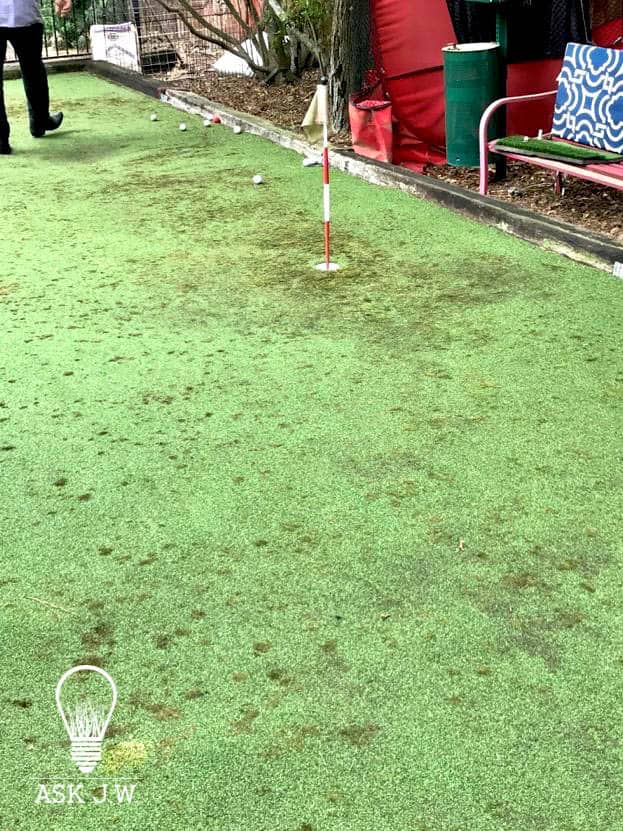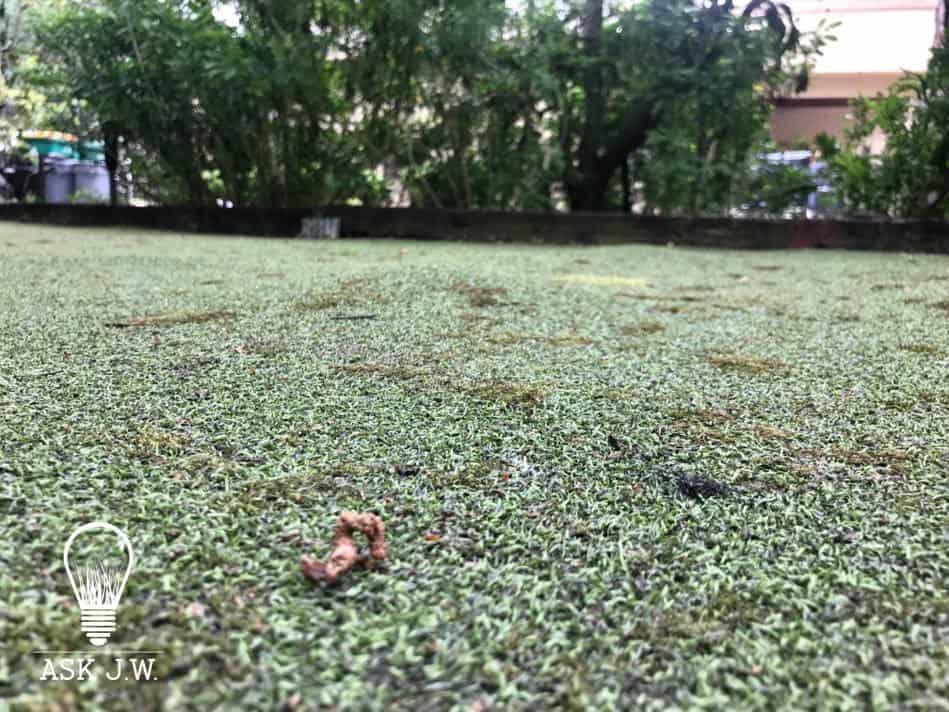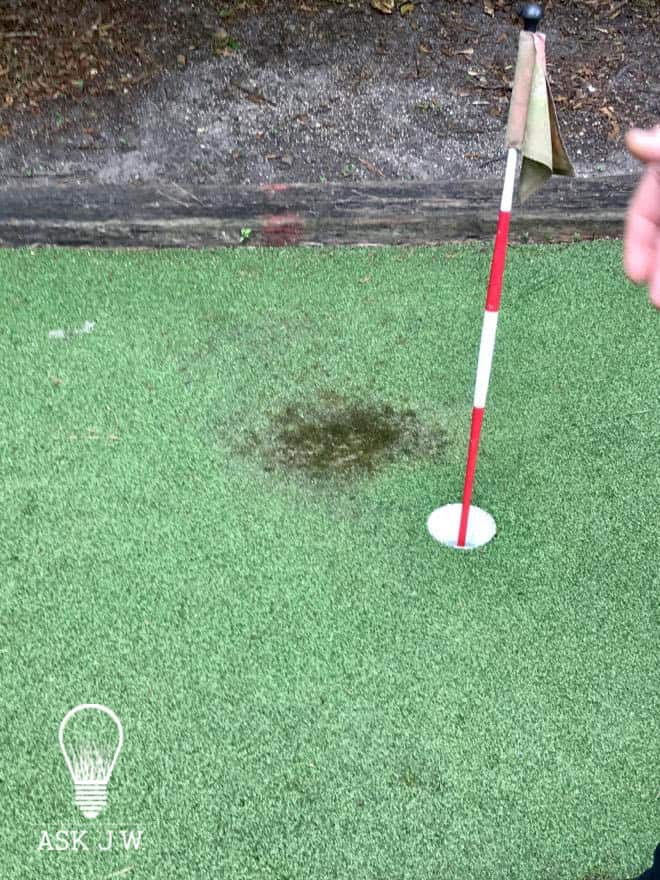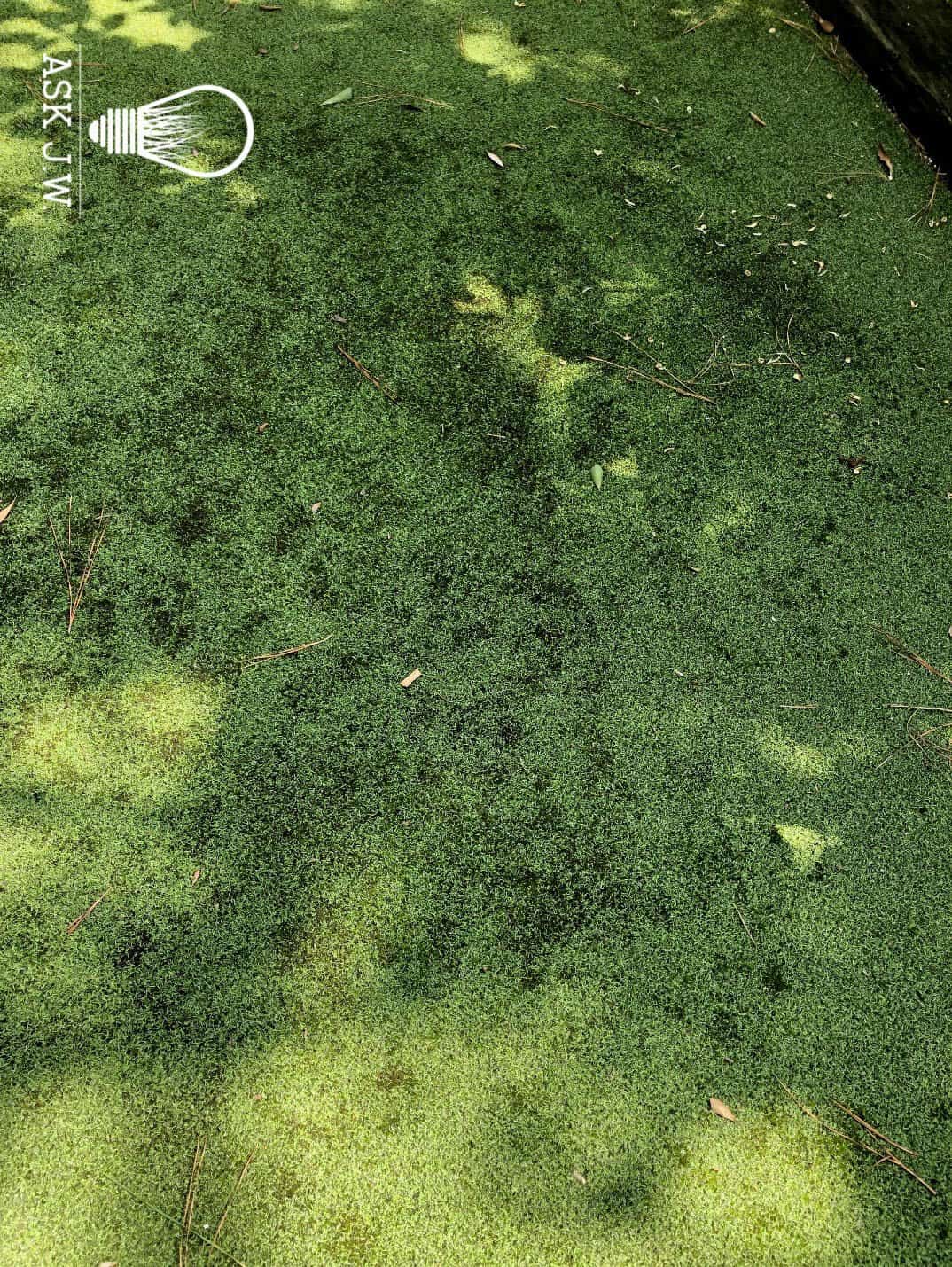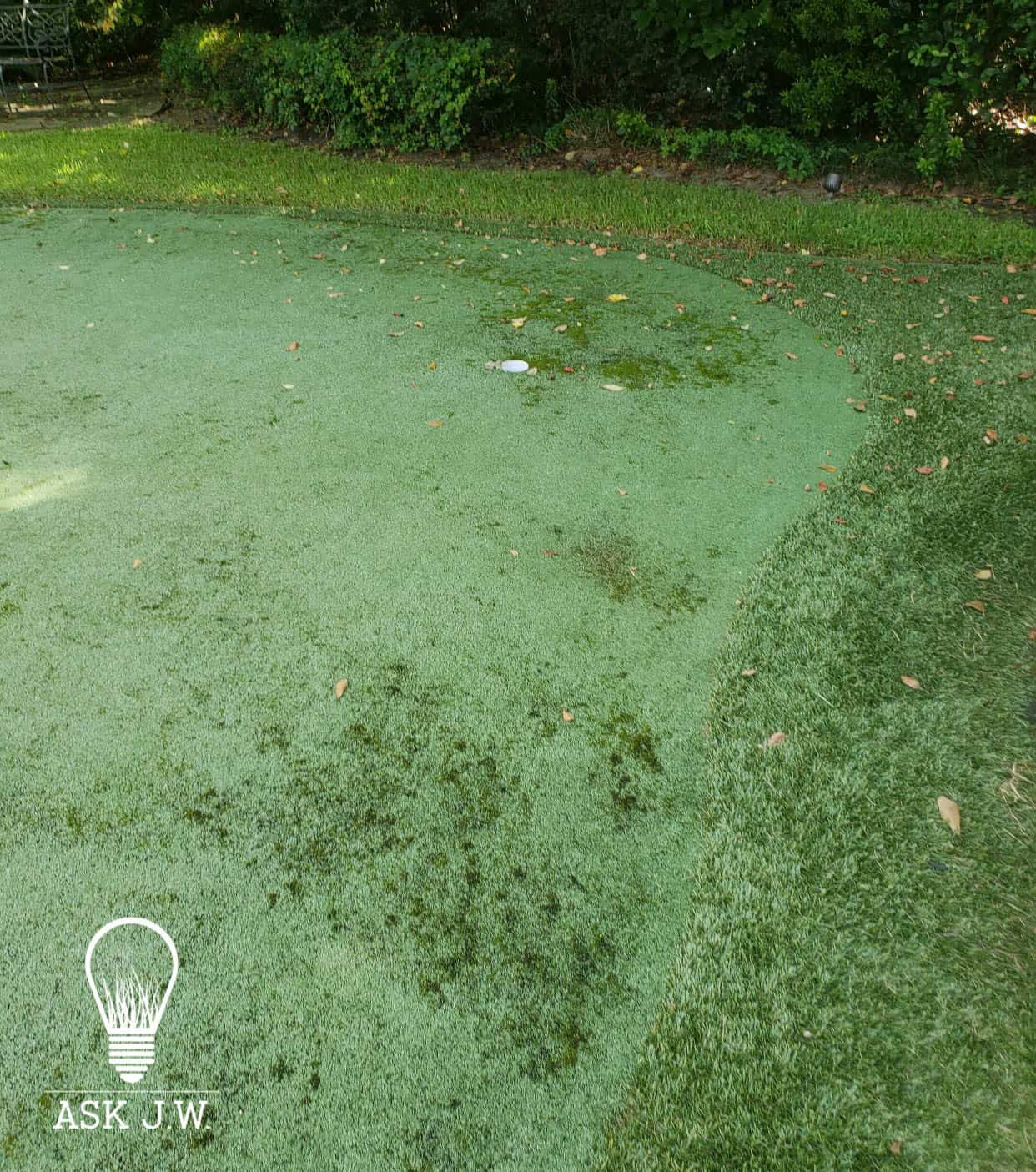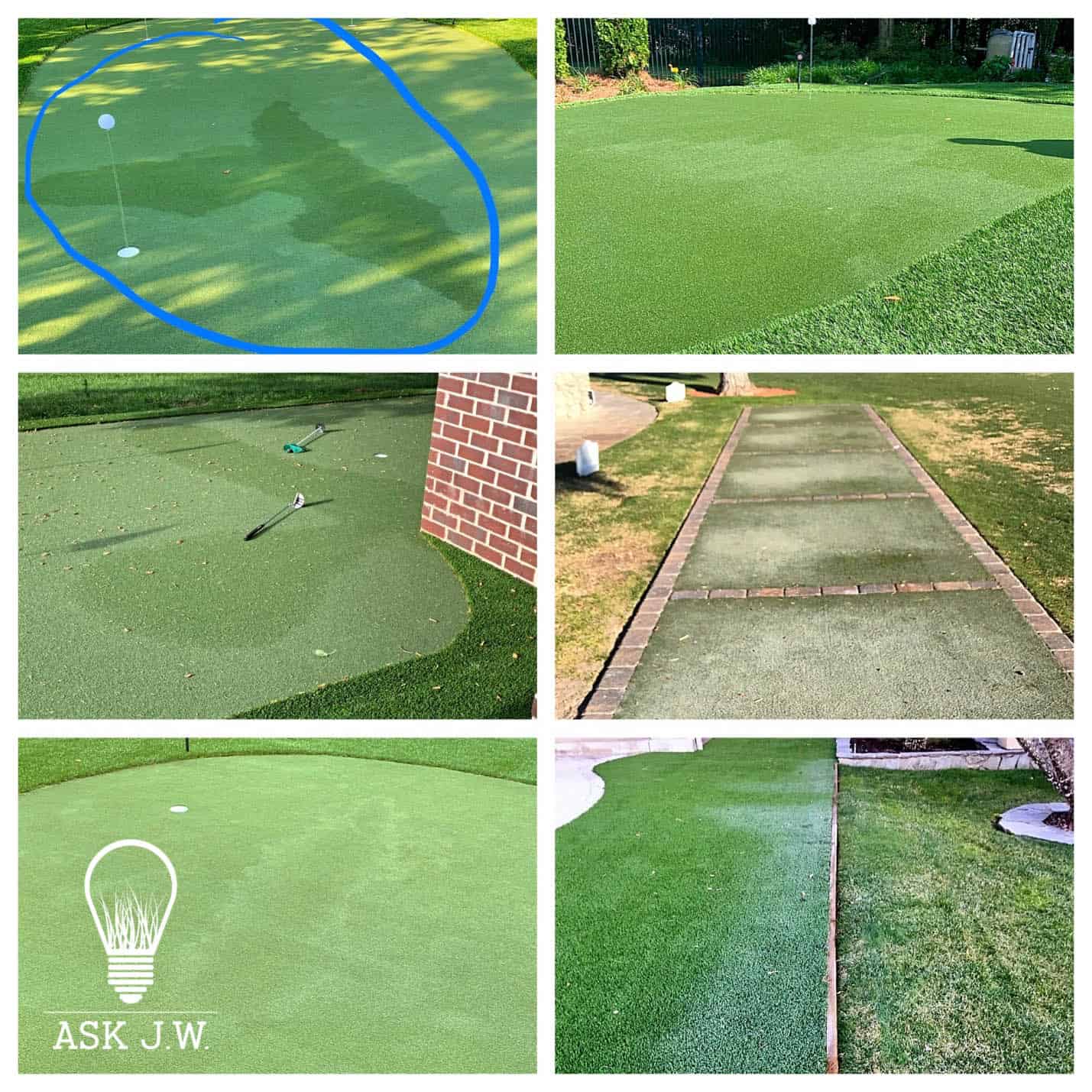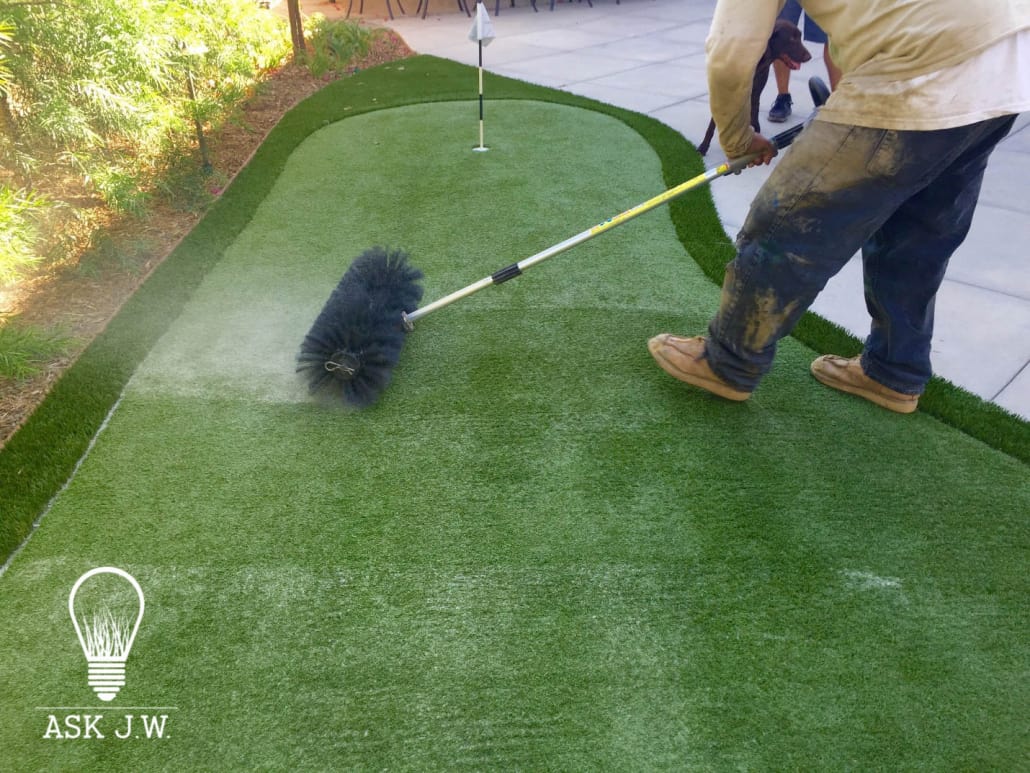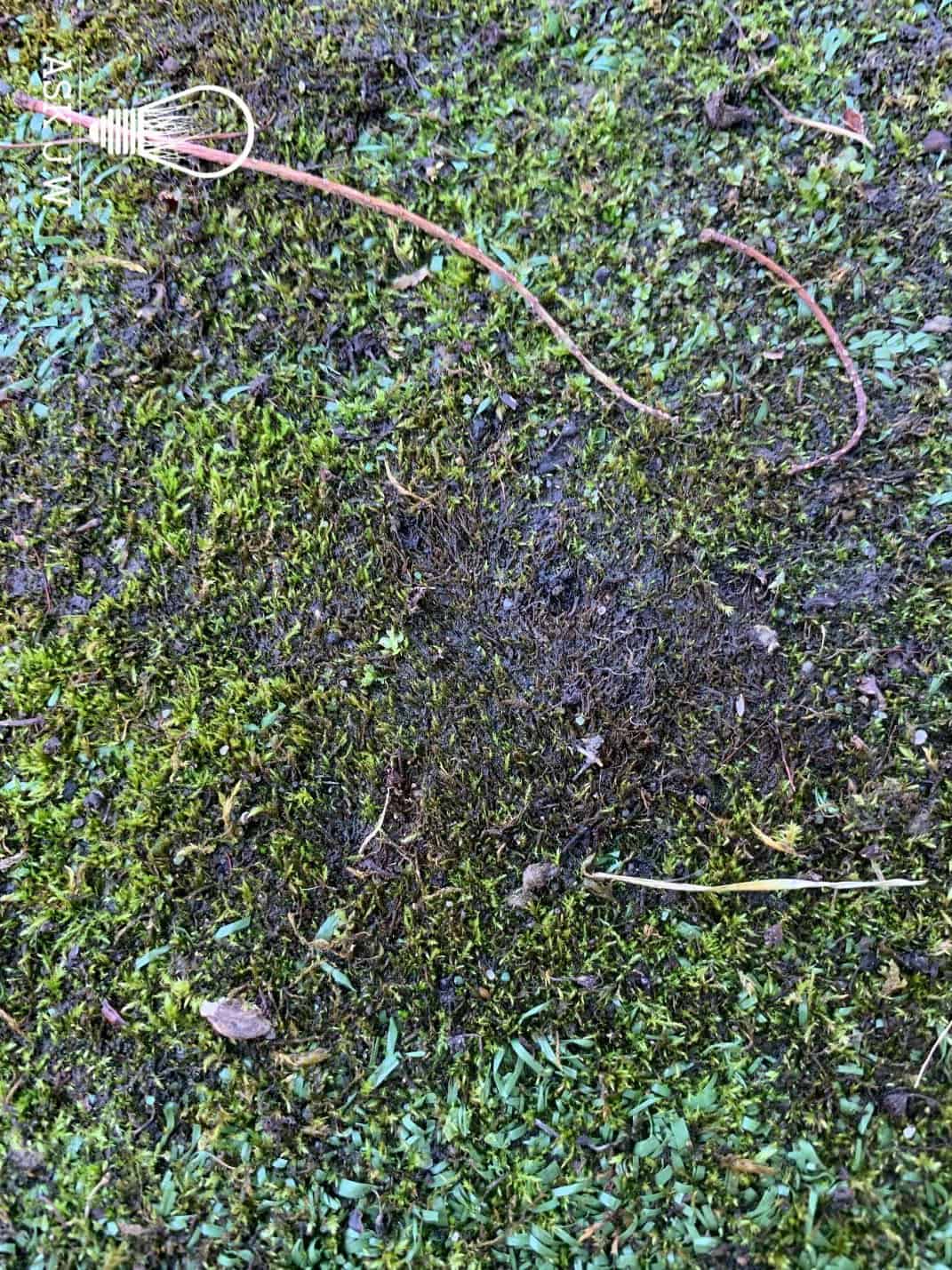Over the decades, synthetic turf has been labeled “maintenance-free”. Mowing, edge trimming, and performing irrigation adjustments are things of the past when you have synthetic turf. However, this does not mean the surface will always stay clean and free of contaminants, microbes, and bacteria, especially synthetic turf putting greens. Most putting green products are designed without drainage holes in the backing.
This lack of drainage holes is imperative to putting green products. It allows the putting green to remain stable through its warranty. Excessive water intrusion into compacted soils may damage the sub-base causing settlement to reveal imperfections in the putting surface. Since moisture has no place to go, it resides within the fibers. When this happens, mold and moss may take over the putting green surface, causing irregular ball roll. Moss has become more of a problem on putting greens in part due to the low pile heights. Once moss becomes established, it may continually create new colonies of moss.
This month ASK JW will talk about surface moss, why it occurs, and how to prevent it from destroying your synthetic grass putting greens.
Shade and Moisture
There are two factors that cause moss in putting greens: shade and moisture. The majority of putting greens with moss that I have witnessed were all installed in shaded areas. Moss predominantly grows in climates where humidity and excessive moisture are present. Moss is more predominant during the cooler temperatures of early to mid-spring and during the fall months. It does not take long for moss to start its destruction. Reducing moisture has been shown to directly reduce moss growth and spread.
If your synthetic turf is continuously wet, not only will hard water deposits bond and stain the fibers, but the occurrence of mold and moss will start to begin. I recommend keeping your putting green surface as dry as possible to avoid this.
Moss Killers
A fact sheet published by the Washington Toxics Coalition listed a few of the least toxic commercial moss killers available on the market. They were:
- Safer Moss & Algae Killer and Surface Cleaner II
- Bayer Advanced 2-in-1 Moss & Algae Killer
- Worry Free Moss & Algae Control
- St. Gabriel Laboratories Moss Killer
Others that I personally know to have success in removing moss and mold are:
- Liquid biodegradable moss removal soap
- Distilled white vinegar (1 tbsp. of distilled white vinegar with 1 gallon of cold water). Apple cider vinegar will also work for this mixture.
- Household bleach diluted with water. Use caution where you apply it, as it can be harmful to living landscapes and pets.
- Moss Out
- Commercial-strength Mold Off
- Biodegrades/neutral pH balance are environmentally friendly options for tough mold and moss problems. They are also safe for use around humans and pets.
**It is crucial to read all application instructions and MSDS sheets, and respect all vegetation, pets, and humans when applying chemicals whether they are labeled as organically safe or not.
Moss Removal
- Remove as much moss as possible from the surface. Depending on the amount of moss and square footage of the installation, a hand or steel floor scraper works great for the initial removal. Be careful not to gouge the surface. Lay the blade of the scraper as flat as possible to prevent damaging the putting green’s surface.
- When most of the moss is removed, use a mechanical power broom to aggressively scrub the putting green fibers, removing any excess moss. If you do not own or cannot rent a power broom, a stiff asphalt broom with lots of elbow grease may do the trick. Remember that moss runs deep.
- Take a water hose, and flush the surface and power broom it at the same time. This may take two people to accomplish. Allow to dry. You may need to do this step multiple times to remove all the moss. Again, allow to dry.
- In the early morning or evening, when the temperature is cool, apply moss killer as directed deep into the surface of the putting green, penetrating to the base of the turf product. Allow to sit for 24 hours. If your putting green is completely covered with moss, you may need to allow the surface to dry and repeat. Sometimes putting greens completely covered by moss may need to be removed and replaced depending how bad they are.
- Early the next morning or evening, when temperatures are cool, repeat step 4 and aggressively scrub the moss killer into the putting green’s surface with a power broom and/or asphalt broom until the entire putting green surface is free of any residue of moss. Flush (don’t flood) the surface with water while brushing at the same time. Again, this may take two people to accomplish. Allow to dry. You may need to do this step multiple times to remove all the moss. Always allow it to dry thoroughly.
- When the moss is removed and the surface is dry, the turf infill will need to be replenished to the proper elevations. When a putting green is depleted of its infill as ballast, the surface will depress and cause irregular ball roll.
For more information on this subject please read:
https://syntheticgrasswarehouse.com/askjw/perfecting-putting-green-surfaces-part-2-infill-placement/
I recommend Envirofill®as your primary infill when placing infill into putting green surfaces. Envirofill is equipped with “Microban”, an antimicrobial agent that fights mold and mildew. Raw sand does not have this built-in defense.
Depending on the amount of future moss build-up, you may not need to perform all the steps above. I recommend treating your synthetic turf once every six months to prevent moss, mold, and mildew reoccurrence.
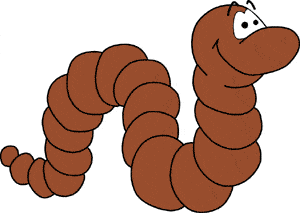
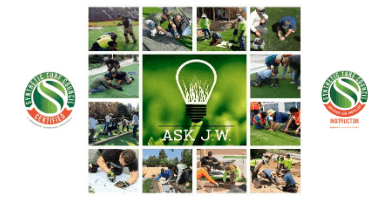
For more information regarding moss on putting green surfaces, or to schedule a training session, please contact J.W. at 888.846.3598 or email AskJW@SGWcorp.com
Suggestions for the use of ASK JW installation techniques are solely at the end users’ discretion; however, the user should determine suitability for the intended use by his/her own evaluation. Because the use of the materials is beyond our control, neither ASK JW nor SGW shall be liable for the outcome of any use of said materials including any injury, loss, or damage, direct or consequential, arising out of the use or inability to use these techniques and products.
Acknowledgements.
Washington Toxics Coalition
US Greentech/Envirofill
Other Topics:

About SGW
Learn more about SGW

Certifications
IPEMA, Lead-Free, and CAD Details
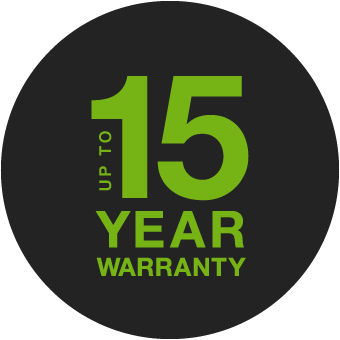
Warranties
Our Industry Leading Warranties

Ask an expert
See if we’ve answered your questions

Media
Our tried and true steps for installation

Blog
Learn about our turf in depth
Find us on social
Here to help
Our Commitment
We are committed to providing the best artificial turf products at competitive prices. Our warehouse carries the most advanced synthetic grass products available, engineered to look and feel like real grass. Every turf product is made with high quality materials that are safe for everyone, especially children and pets.

Industry Leaders
SGW Seattle has always stood out among competitors, offering new products with the latest technology.

Service Oriented
The only thing better than our grass is our customer service. Our staff is committed to providing the best experience possible for our clients.

Quality Driven
At SGW Seattle we only offer products that maintains a high standard of quality. Backed by up to a 15 year warranty, the best in the industry.

